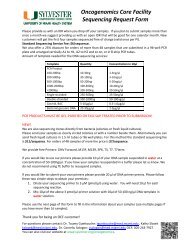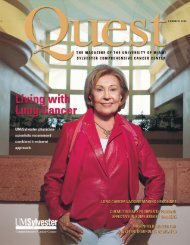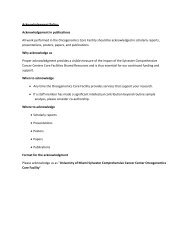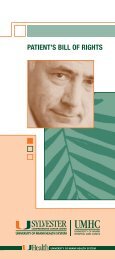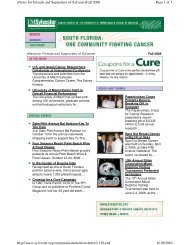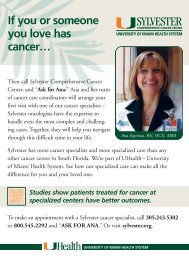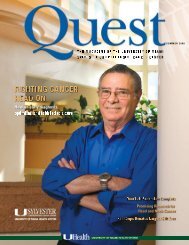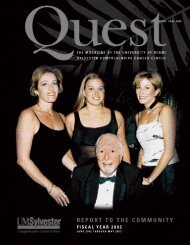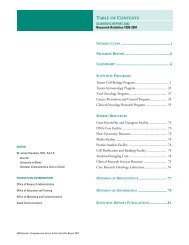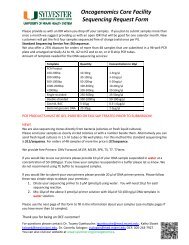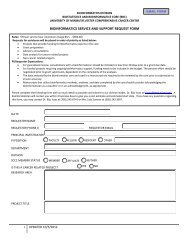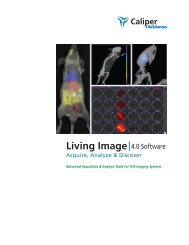SCIENTIFIC REPORT 2004 - Sylvester Comprehensive Cancer Center
SCIENTIFIC REPORT 2004 - Sylvester Comprehensive Cancer Center
SCIENTIFIC REPORT 2004 - Sylvester Comprehensive Cancer Center
Create successful ePaper yourself
Turn your PDF publications into a flip-book with our unique Google optimized e-Paper software.
C A N C E R P R E V E N T I O N A N D C O N T R O L P R O G R A M<br />
years to conduct a clinical trial testing the effects<br />
of low-dose estrogen treatment on quality of life,<br />
osteoporosis risk, and other physical indicators in<br />
men who had undergone androgen deprivation<br />
therapy for metastatic prostate cancer. This<br />
project is funded by the NCI as part of the<br />
<strong>Center</strong> for Psycho-Oncology Research (CPOR),<br />
which is directed by Michael H. Antoni, Ph.D.<br />
SELECTED PUBLICATIONS<br />
2002<br />
Levis, S, Quandt, SA, Thompson, D, Scott, J,<br />
Schneider, DL, Ross, PD, Black, D, Suryawanshi,<br />
S, Hochberg, M, and Yates, J. Alendronate reduces<br />
the risk of multiple symptomatic fractures:<br />
results from the fracture intervention trial. Journal<br />
of the American Geriatric Society 50:409-15,<br />
2002.<br />
2003<br />
Hernandez-Cassis, C, Vogel, CK, Hernandez, TP,<br />
Econs, MJ, Iglesias, M, Iglesias, A, Levis, S,<br />
Roos, BA, Howard, GA, and Gamarra, AI. Autosomal<br />
dominant hyperostosis/osteosclerosis with<br />
high serum alkaline phosphatase activity. Journal<br />
of Clinical Endocrinology & Metabolism<br />
88:2650-55, 2003.<br />
HIGHLIGHTS/DISCOVERIES<br />
• Discovered that vitamin D deficiency in South<br />
Florida residents is higher than expected: approximately<br />
25 percent in young adults and 30<br />
percent in the elderly.<br />
FRANK J. PENEDO, PH.D.<br />
Assistant Professor of Psychology<br />
Psycho-Oncology, Psychology of Aging and<br />
Immunosenescence in Chronically Ill Older<br />
Adults<br />
Within the fields of health psychology and behavioral<br />
medicine, cancer and the human immunodeficiency<br />
virus (HIV) have provided unique<br />
opportunities to evaluate the role of psychosocial<br />
factors in disease acquisition and progression<br />
among various populations. Part of Dr. Penedo’s<br />
research is examining the role of psychosocial factors<br />
such as stress, coping, and personality style in<br />
psychological distress and physical health status<br />
in three specific populations: 1) HIV+ ethnically<br />
diverse men who have sex with men (MSM) and<br />
heterosexual older men with a history of substance<br />
use, 2) men treated with radical prostatectomy<br />
or radiation for localized prostate cancer,<br />
and 3) men and women diagnosed with Stages I-<br />
III of head and neck cancer.<br />
Dr. Penedo’s research with these chronic disease<br />
groups is focused primarily on evaluating the<br />
efficacy of group- and individual-based stress<br />
management interventions on reducing distress<br />
and improving quality of life (QOL) and physical<br />
health status among older cancer or HIV populations<br />
(50 years and older). Dr. Penedo is particularly<br />
interested in how psychosocial factors such<br />
as stress, coping, and personality style may interact<br />
with health behaviors (e.g., treatment adherence),<br />
neuroendocrine function, and the agerelated<br />
decrements in immune function (i.e.,<br />
immuno-senescence) seen in older populations.<br />
More specifically, he is interested in how stress<br />
and other psychosocial factors may interact with,<br />
and exacerbate, age-related decrements in immune<br />
function on the one hand, and disease<br />
progression in older cancer and HIV populations<br />
on the other.<br />
Several of the research questions involved in<br />
Dr. Penedo’s work aim to answer: 1) whether psychosocial<br />
factors impact neuroendocrine and immune<br />
parameters in chronically ill older adults<br />
(e.g., Does psychological stress-related activation<br />
24<br />
UM/<strong>Sylvester</strong> <strong>Comprehensive</strong> <strong>Cancer</strong> <strong>Center</strong> Scientific Report <strong>2004</strong>




